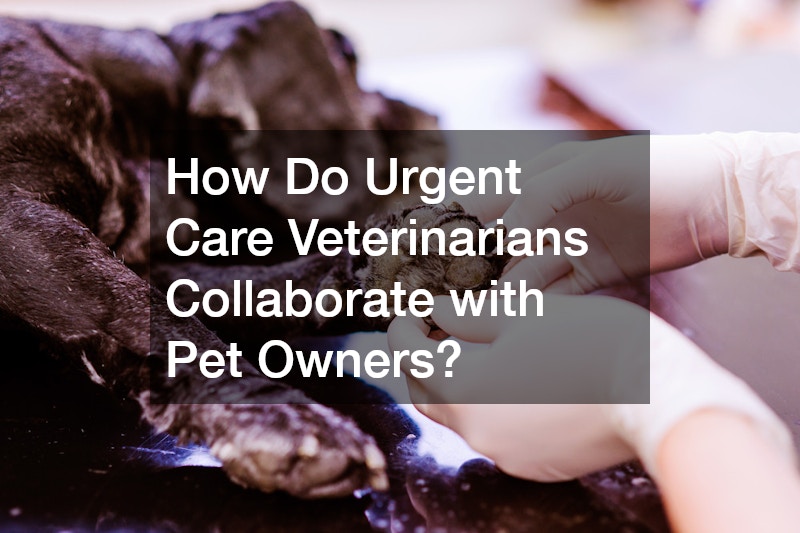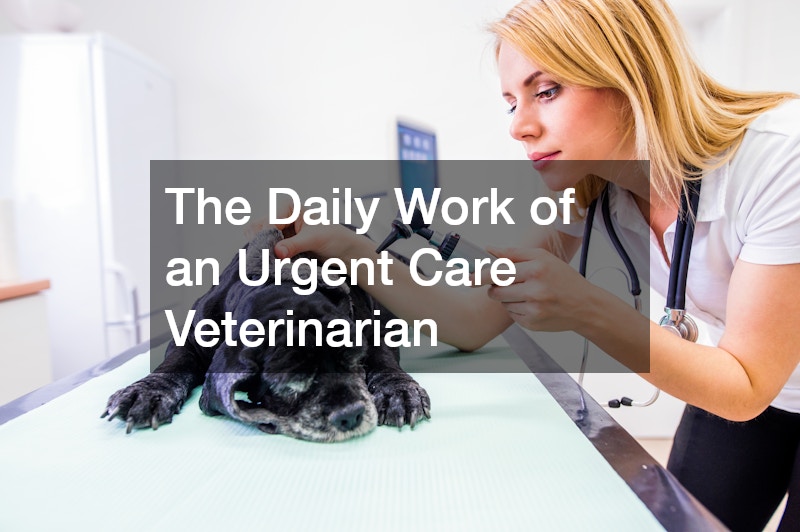Stepping into the shoes of an urgent care veterinarian unveils a day filled with unexpected challenges and fulfilling rewards. These professionals bridge the gap between immediate pet emergencies and general veterinary care, ensuring that animals receive timely and effective treatment in critical moments.
What Does an Urgent Care Veterinarian Do?
Typical Responsibilities and Duties
Urgent care veterinarians start their day by preparing for a variety of cases, ranging from minor injuries to severe health crises. Their responsibilities often include rapidly diagnosing conditions, stabilizing patients, and performing emergency procedures.
They frequently manage a high volume of cases, requiring them to be adept at multitasking and prioritizing based on the severity of each situation. This role demands seamless coordination with veterinary nurses, support staff, and sometimes specialists to provide comprehensive care.
Constantly on their toes, they must be ready to tackle any number of unexpected scenarios that walk through their doors. The dynamic nature of this work requires quick thinking and decisive action in a rapidly changing environment.
Differences Between Urgent Care and General Practice
Unlike general practice veterinarians who focus on preventative care and routine check-ups, urgent care vets deal with immediate health crises. The urgent care setting necessitates fast-paced decisions that can significantly impact an animal’s outcome within minutes.
While general practitioners often form long-term relationships with their clients, urgent care veterinarians see a rotating roster of patients, focusing on acute care rather than ongoing management. Their expertise lies in stabilizing patients efficiently and creating a bridge to further treatment or specialized care if needed.
This style of practice calls for a different set of skills and mentality, focusing on triage and immediate intervention rather than long-term therapeutic strategies. Being able to pivot quickly and maintain a calm demeanor under pressure is a distinguishing trait in this field.
How Does Urgent Care Vet Work Impact Animals’ Health?
Immediate Diagnosis and Treatment
The swift diagnostic abilities of urgent care veterinarians often spell the difference between life and death for their patients. They rely on their extensive knowledge and experience to make rapid assessments and initiate treatment without delay.
This prompt action is particularly crucial in time-sensitive situations like toxin ingestion or severe injuries, where every minute counts. Their ability to quickly interpret vital signs and laboratory results allows them to swiftly determine the most effective course of action.
Animal health benefits greatly from such timely interventions, as immediate care can avert potential complications and facilitate smoother recoveries. The overarching goal is to stabilize the patient and ensure they are out of immediate danger.
Case Success Stories
Numerous cases exemplify the lifesaving impact of urgent care intervention. For instance, in instances where animals suffer from acute allergic reactions, timely administration of medications can be pivotal.
In other success stories, quick responses to traumatic injuries have led to significant recovery rates, emphasizing the critical nature of their work. These professionals often witness miraculous turnarounds when prompt action is taken.
One notable fact is that many urgent care veterinarians play a vital role in mentoring new veterinarians, passing on practical skills needed for high-stakes situations. Each success story adds a layer of satisfaction, reinforcing their commitment to this demanding yet gratifying profession.
What are the Challenges Faced by Urgent Care Veterinarians?
High-Stress Environment
The pressure to deliver immediate care in high-stress situations is a constant challenge for urgent care veterinarians. Balancing multiple emergencies simultaneously can lead to heightened stress levels and mental fatigue.
Managing the emotional highs and lows associated with critical care requires tremendous resilience and emotional strength. Veterinarians in this field often develop coping mechanisms to deal with the intensity of their work effectively.
Such a fast-paced environment also demands exceptional organizational skills and the ability to work swiftly without compromising quality. It’s essential for urgent care veterinarians to find healthy ways to decompress and recharge.
Resource Limitations
Urgent care facilities can occasionally face resource limitations, such as a shortage of specialized equipment or medications. Veterinarians must be adaptable, often finding creative solutions to deliver effective care under such constraints.
These professionals frequently collaborate with nearby full-service clinics or hospitals to access additional resources when necessary. Despite these challenges, urgent care vets continuously strive to ensure the best possible outcomes for their patients.
Resourcefulness becomes a key part of their skill set, often relying on their knowledge and quick problem-solving abilities to make the best of the situation. Effective resource management is crucial for maintaining the smooth operation of an urgent care practice.
How Do Urgent Care Veterinarians Collaborate with Pet Owners?
Communication During Emergencies
Effective communication with pet owners is a cornerstone of urgent care veterinary work, especially during emergencies. Clear and concise explanations about diagnoses, treatment options, and potential outcomes build trust and understanding.
Urgent care veterinarians often need to deliver difficult news empathetically while also providing reassurance and support. Their ability to articulate medical information in layman’s terms helps in managing pet owners’ expectations and facilitating informed decision-making.
Proactive communication is vital during crises, as it fosters a collaborative environment where pet owners feel involved in their pets’ care. Establishing this rapport significantly enhances the overall treatment experience.
Aftercare and Follow-Up
Post-treatment, urgent care veterinarians ensure pet owners are equipped with comprehensive guidance to aid their pet’s recovery. Follow-up communications often include instructions on medication administration, dietary modifications, and activity restrictions.
This continuous engagement ensures that the animal receives adequate care outside the clinical setting, reducing the likelihood of complications and fostering better recovery outcomes. Pet owners appreciate the consistent support and reassurance provided during this phase.
Building long-term relationships isn’t typical for urgent care veterinarians, but they often collaborate with a patient’s primary veterinarian to ensure continuity of care. This emphasizes the cooperative nature of veterinary healthcare and the collective effort to prioritize animal welfare.


